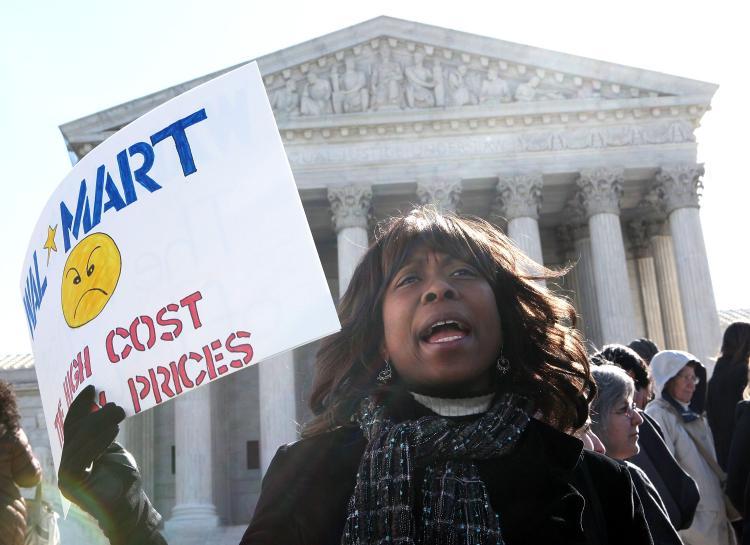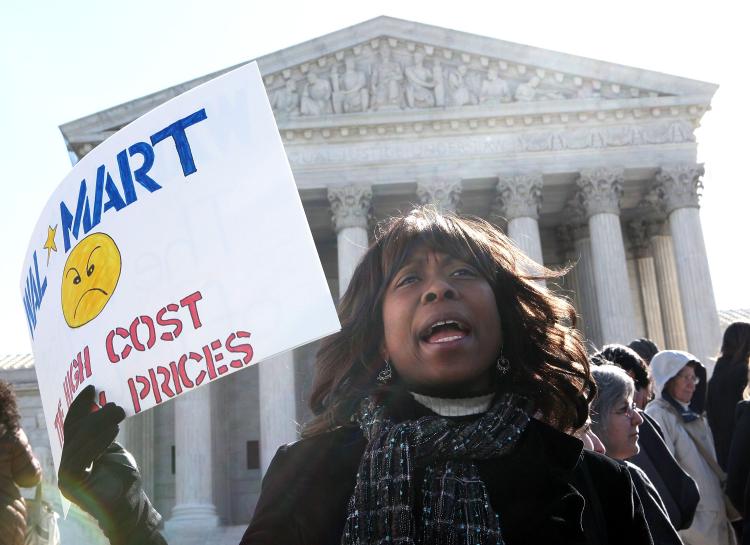In the largest class action lawsuit in U.S. history, the Supreme Court conducted a hearing on behalf of millions of Wal-Mart female employees on Wednesday, March 30.
The class action suit is reported to represent up to 1.5 million current and former women, who claimed discriminatory treatment while being employed at Wal-Mart.
Wal-Mart Stores Inc. has over 3,400 department stores in America and is the largest private employer. However, while women comprise over 80 percent of the workers, they hold only one-third of the managerial positions, reports the Guardian.
Betty Dukes, representing 1.5 million Wal-Mart female employees, filed suit in 2001. She alleged that Wal-Mart male managers purposefully underpaid its female staff, engaged in discriminatory promotion practices, and failed to provide adequate training, while maintaining “typical gender stereotypes.”
Wal-Mart denies the charge and maintains it has a strict anti-discrimination policy. It argues that the class action is unwarranted, given that the alleged victims worked in 3,400 stores and 170 job classifications.
If successful, the lawsuit will have a significant impact on the U.S. private sector, making almost any corporation vulnerable to similar class actions of gender-based discrimination.
The class action device permits millions of allegedly injured people to “aggregate” their claims in one representative litigation. The American class action rule has been in existence since 1938, but the procedure took its modern form through a rule revision in 1966.
The Wal-Mart case is driven by six women, who to win the case, must convince the court that their claims are representative of the millions of women it the lawsuit.
Wal-Mart argued that lower courts’ liberal application of class certification requirements was inappropriate where hundreds of thousands of individualized employment decisions were involved. Therefore, the women’s claims did not share common facts and were not typical of each other, reports the Guardian.
The Supreme Court will likely announce its decision on the Dukes v. Wal-Mart sex discrimination case in June.
The class action suit is reported to represent up to 1.5 million current and former women, who claimed discriminatory treatment while being employed at Wal-Mart.
Wal-Mart Stores Inc. has over 3,400 department stores in America and is the largest private employer. However, while women comprise over 80 percent of the workers, they hold only one-third of the managerial positions, reports the Guardian.
Betty Dukes, representing 1.5 million Wal-Mart female employees, filed suit in 2001. She alleged that Wal-Mart male managers purposefully underpaid its female staff, engaged in discriminatory promotion practices, and failed to provide adequate training, while maintaining “typical gender stereotypes.”
Wal-Mart denies the charge and maintains it has a strict anti-discrimination policy. It argues that the class action is unwarranted, given that the alleged victims worked in 3,400 stores and 170 job classifications.
If successful, the lawsuit will have a significant impact on the U.S. private sector, making almost any corporation vulnerable to similar class actions of gender-based discrimination.
The class action device permits millions of allegedly injured people to “aggregate” their claims in one representative litigation. The American class action rule has been in existence since 1938, but the procedure took its modern form through a rule revision in 1966.
The Wal-Mart case is driven by six women, who to win the case, must convince the court that their claims are representative of the millions of women it the lawsuit.
Wal-Mart argued that lower courts’ liberal application of class certification requirements was inappropriate where hundreds of thousands of individualized employment decisions were involved. Therefore, the women’s claims did not share common facts and were not typical of each other, reports the Guardian.
The Supreme Court will likely announce its decision on the Dukes v. Wal-Mart sex discrimination case in June.





